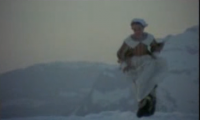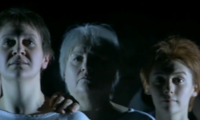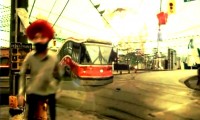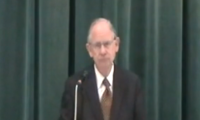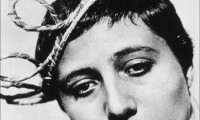I was in a production of Marlowe’s “Dr Faustus” once, in first year university. Our Helen of Troy, the face that launched a thousand ships and burnt the topless towers of Ilium, was sleeping with the director. At least that’s what I thought at the time. For the part, he dressed her up in a spandex body suit that was frankly ridiculous.
In other words, not like this at all.
Dimitris Papaioannou, “The Return of Helen” (1999)
But like so much theatre, our production was a potent combination of the ridiculous and the most definitely not ridiculous. It also featured the great Canadian poet and teacher Jan Zwicky in the part of Mephistopheles.
(I played one of her minions, with such youthful vigour as I recall, that, at the flick of Jan’s wrist, I used to hurl myself head first off the back of a riser, straight down into the vastness of space, though the floor was only a few feet away.)
The iconic Mephistopheles that sits in our subconscious comes from Goethe more than Marlowe – a fat, smiling lascivious man, like Emil Jannings in F. W. Murnau’s silent film version.
But that’s not the character that Marlowe wrote, nor what Jan Zwicky played.
Her Mephistopheles, and Marlowe’s, was more gourmet than gourmand – an aching aesthetic scholar who had not lost an ounce of appreciation for the world’s beauty. That she was fundamentally separated from that beauty even as it was at her fingertips was the special quality of her damnation.
Meph: Why this is hell, nor am I out of it.
Think’st thou that I, who saw the face of God,
And tasted the eternal joys of heaven,
Am not tormented with ten thousand hells
In being deprived of everlasting bliss?
But she could still experience it vicariously through the hungry, human, as-yet un-damned Faustus.
I’ve never seen anyone else play the part, so for me, Jan’s interpretation will always represent Marlowe’s vision. I recall her subtly expressed disappointment at some of Faustus’ more childish demands, and yet she was just as ready to grant those demands as she was to peel back the most sublime secrets of the universe. The chance to see Helen was, for Jan’s Mephistopheles, more about the latter than the former:
Meph: Faustus, this, or what else thou shalt desire,
Shall be perform’d in twinkling of an eye.
There was also a feeling in Jan’s performance that she considered herself the only companion equal to Faust’s intellectual gifts. If he were not so blinded by the beauty of a woman who was in fact long dead – the epitome of earthly beauty – he would see in his Mephistopheles more a Helen than that lugubrious Greek dame creaking her elastane way across the stage.
Faustus: Her lips suck forth my soul: see, where it flies!
Come, Helen, come, give me my soul again.
Here will I dwell, for heaven is in these lips,
And all is dross that is not Helena.
Still, Jan’s Mephistopheles was dutiful to her underworld master. She set the trap – offering the learned doctor a headlong plunge into the riches of the world – and let him snare himself.
Faustus: I, John Faustus, of Wertenberg, doctor, by these presents, do give both body and soul to Lucifer prince of the east, and his minister Mephistophilis; and furthermore grant unto them, that, twenty-four years being expired, the articles above-written inviolate, full power to fetch or carry the said John Faustus, body and soul, flesh, blood, or goods, into their habitation wheresoever. By me, John Faustus.
In the end, Lucifer comes to drag the doctor down to hell (an inadvertent foreshadowing of the playwright’s own great reckoning in a little room not long after the script was penned). Not even Goethe, two centuries later, could bring himself to do the doctor like that. He created the part of Gretchen, a character to whom F. W. Murnau later tied Faust’s salvation even as the old man clutched her knees and they burned at the stake together.
F.W. Murnau, “Faust,” (1926)
Of course, Google, like Mephistopheles, puts wings to the world at our Faustian heels as well. Like Jan’s Meph, it is a companion equal to our gifts. We can learn and hear and see so much. But there is so much to see.
In the clip above, we saw, on our computer screens, a man and woman, both damned, both burning, both blissfully happy.
They were delivered even in their damnation. We, on the other hand, get our damnation with our delivery. If we’re not careful, we end up living our lives in little boxes, eyes glued, seeking so many Helens to suck our souls through the pixilated barrier. (click on picture to watch video)
 my-cam blogspot, “Glass Lick,” (2007)
my-cam blogspot, “Glass Lick,” (2007)
No fire here for us to happily hurl ourselves upon. You have to venture out into the world for that.
– Sean Dixon
